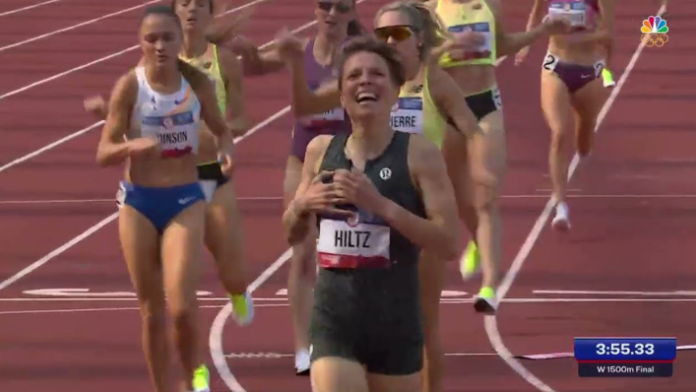Transgender and nonbinary middle-distance runner Nikki Hiltz has made headlines by becoming the first transgender woman to qualify for Team USA in the 2024 Paris Olympics. At the U.S. Olympic Trials, Hiltz ran the second-fastest time ever by an American in the women’s 1500-meter race, finishing in 3:55.33 and setting a new trials record. This remarkable performance has sparked conversations across various communities.
Hiltz, who uses they/them pronouns, surged ahead in the final stretch, outpacing Elle St. Pierre and Emily Mackay. This victory not only marked a personal milestone for Hiltz but also set the stage for a broader dialogue about inclusion and fairness in sports. “This is bigger than just me. It’s the last day of Pride Month. … I wanted to run this one for my community,” Hiltz said in a post-race interview with NBC Sports, acknowledging the support from the LGBTQ community.
However, Hiltz’s participation in women’s sports has not been without controversy. The debate over transgender athletes competing in categories that align with their gender identity, particularly when they have gone through male puberty, is a contentious issue. Critics argue that biological differences may provide an unfair advantage, while supporters emphasize the importance of inclusivity and equal opportunities.
The Official Rules
World Athletics, the governing body for international track and field, adopted a policy last year that bars all trans women athletes who went through male puberty from competing in female categories. However, Hiltz is competing as a nonbinary athlete, a category not specifically addressed by the policy.
In the broader landscape of the Olympics, the International Olympic Committee updated its rules in 2021, deferring to each sport’s governing body regarding transgender athletes. This approach aims to balance inclusivity with fairness, though it leaves room for ongoing disputes and adjustments.
Despite the controversy, Hiltz’s achievements are undeniable. Their success is a testament to their dedication and athletic prowess. Elle St. Pierre, who finished third and was the top-finishing American in the Tokyo Olympics women’s 1500 meters, praised Hiltz’s performance, noting that it pushed all competitors to elevate their efforts.
“Elle St. Pierre has elevated women’s distance running. I saw the time, and I didn’t think that was possible,” Hiltz commented, highlighting the collective progress in the sport.
Hiltz’s journey is also a deeply personal one. They expressed profound gratitude and joy upon qualifying for the Paris Olympics, sharing on social media, “I’m not sure when this will fully sink in. All I know is today I’m waking up just so grateful for my people, overwhelmed by all the love and support, and filled with joy that I get to race people I deeply love and respect around a track for a living.”

